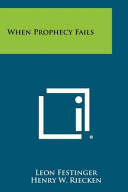 Last Saturday I attended a memorial service in Washington for Henry Riecken, an old friend’s father, who died last December at the age of 95. Trained in developmental psychology, Riecken was one of the high priests of American social science during its mid-20th-century heyday, serving in a variety of professorial and administrative capacities, including as first director of the National Science Foundation’s social science division and then as president of the Social Science Research Council.
Last Saturday I attended a memorial service in Washington for Henry Riecken, an old friend’s father, who died last December at the age of 95. Trained in developmental psychology, Riecken was one of the high priests of American social science during its mid-20th-century heyday, serving in a variety of professorial and administrative capacities, including as first director of the National Science Foundation’s social science division and then as president of the Social Science Research Council.
But he earned lasting fame as one of the three co-authors of When Prophecy Fails, the classic account of true believers who refuse to give up their beliefs even when faced with definitive proof to the contrary. Six decades ago, Riecken, Leon Festinger, and Stanley Schachter identified a small cult called the Seekers who believed that a flying saucer would rescue them from a gigantic flood that would destroy the world on December 21, 1954. Figuring that the flying saucer would not arrive and the flood would not happen, the three infiltrated the group in order to see how the cognitive dissonance would be resolved. Sure enough, the appointed day arrived and rather than accepting empirical disconfirmation, the Seekers invented a new story that enabled them to keep their faith.
The study, which achieved immediate fame, provided a social scientific demonstration of the persistence of apocalyptic groups like the Seventh-Day Adventists, heirs of the followers of William Miller, who prophesied that the world would come to an end in the 1840s. However, I suspect that the book had the impact it did not because of an interest in the apocalyptic fringe but because it showed the limits of empiricism as a mode of persuasion. The book might have been titled Why Social Science Fails. Groups with powerful convictions won’t change their views just because the empirical evidence says them nay.
Of course, large groups tend to be composed of adherents whose intellectual commitment ranges from the lukewarm and pragmatic to the passionate and existential. One way to understand today’s Republican Party is in terms of a tug-of-war between those who take President Obama’s reelection as empirical evidence for the need to change GOP positions and those who insist that the recipe for political success is doubling down on true belief. For them, the flying saucer is still on its way.





